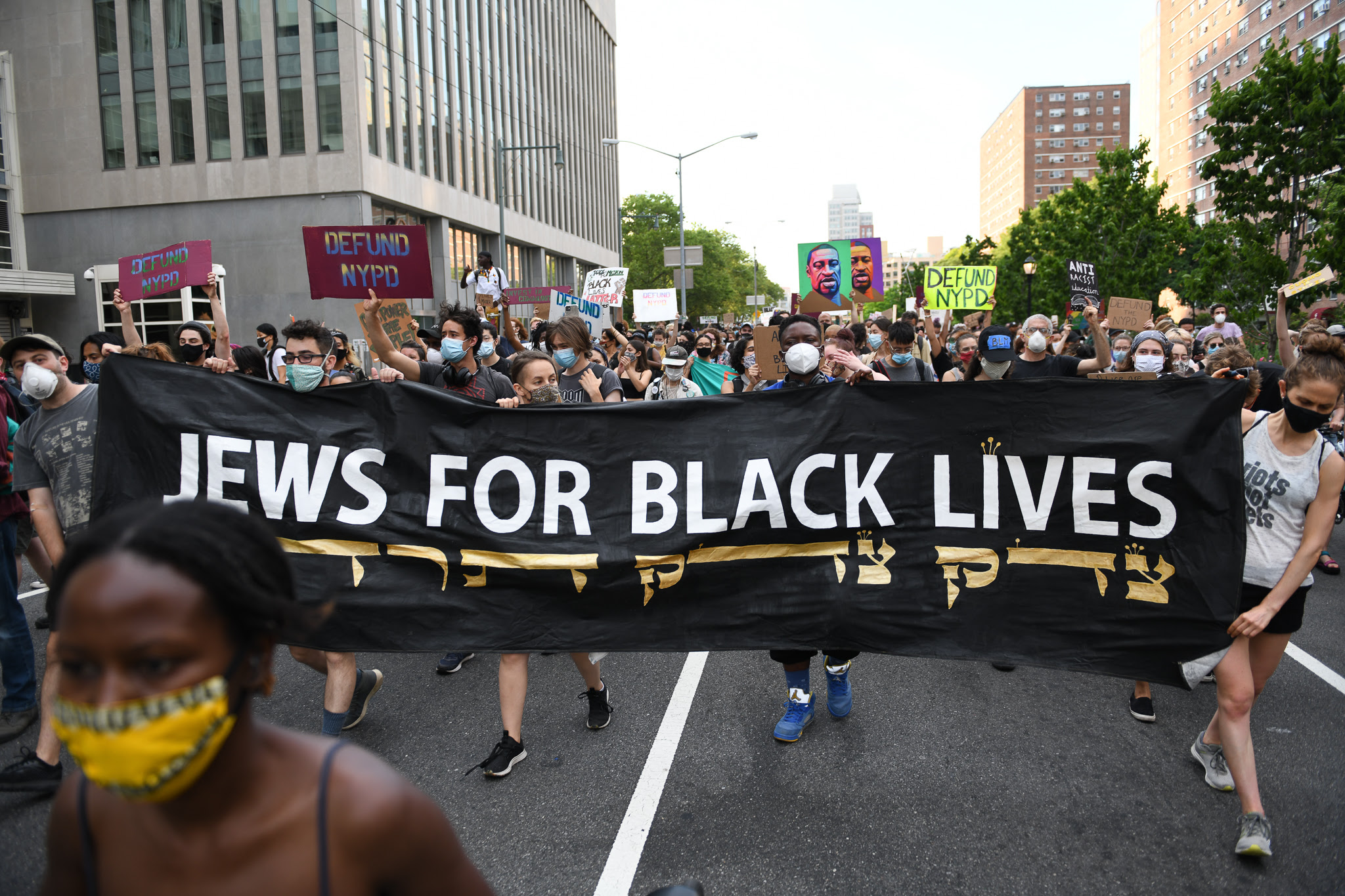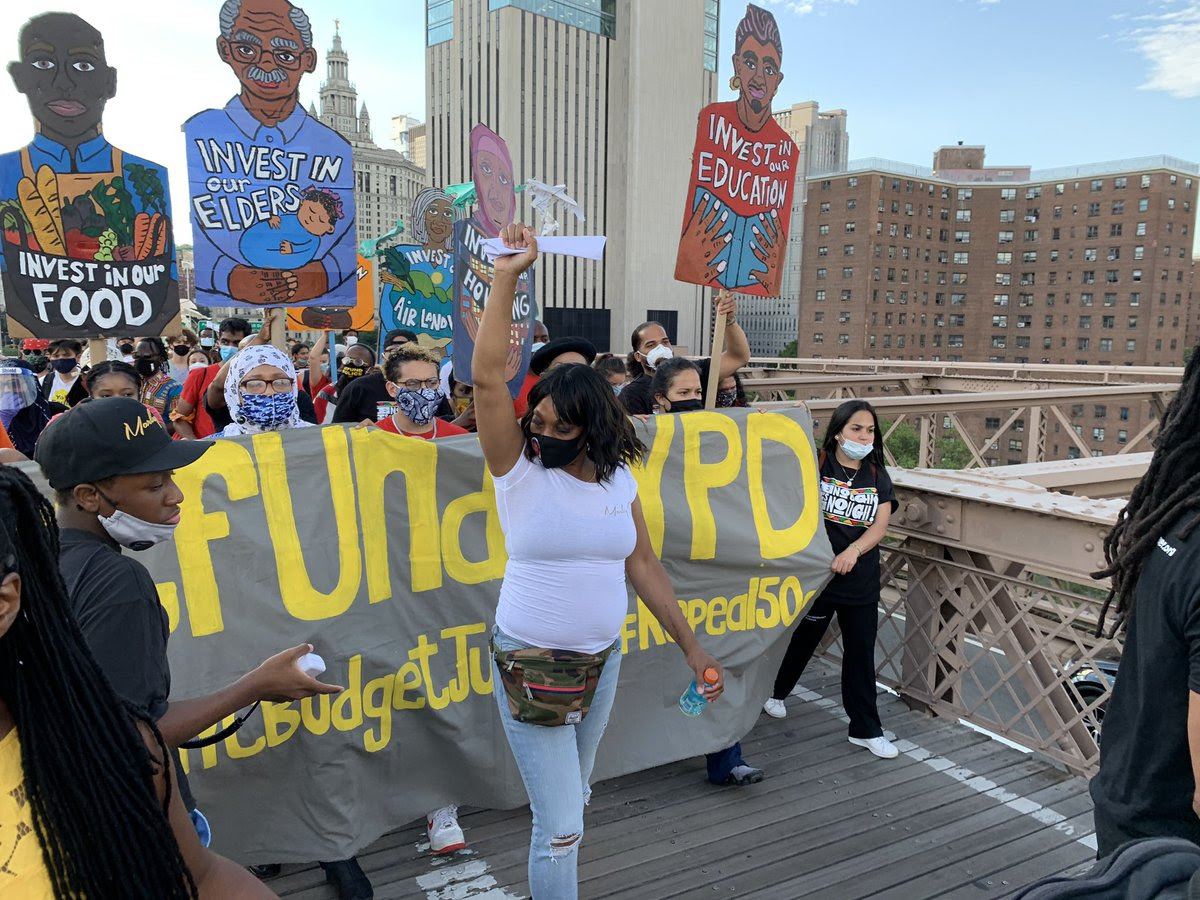It’s been just over a week since the City Council passed its FY21 budget in the early hours of July 1st. Since then, I have been reflecting on the vote, and the whirlwind of organizing and activity that led up to it. So much happened in such a short time that I think I will be unpacking and rethinking for weeks to come, however at least a few things are clear. Here are some thoughts on this moment and where we go from here.
Black Lives Matter is the most potent political movement in decades.
I am still in awe of the May uprisings across the country and in New York City. The courage, clarity, and decisiveness of the Black people who led us all into the streets after the deaths of George Floyd, Breonna Taylor, Ahmaud Arbery, Tony McDade and others was made possible by the framework and language given to us by Black Lives Matter and the Movement for Black Lives coalition. And once the uprisings began, Black-led organizations and coalitions (including many that did not exist 5 years ago) were ready to channel that energy into significant political wins at the city and state level throughout the nation. Even as pandering elected officials and even some right-wing politicians attempt to co-opt the phrase “Black Lives Matter,” (for example, by painting it in big yellow letters on city streets) activists continue to resist and advance our political vision (for example, by adding “= Defund the Police” to a sentiment that politicians are eager to depoliticize). Black progressive leadership must remain at the center of our fight for racial and economic justice.

Photo by Gili Getz
While we scored very significant wins in Albany, New York City’s democracy is broken, and its elected political leaders are largely out of touch and ineffective.
What else can you conclude after the events of the past few months here in New York City? We watched Black and Latinx New Yorkers die of COVID-19 at staggeringly disproportionate rates, reflecting the city’s failure to provide the support and resources our communities needed. We watched the NYPD’s social distancing enforcement reproduce precisely the same racism that the NYPD always manifests. And when New Yorkers poured into the streets by the thousands to say, “enough!” the NYPD ratified our every critique by abusing and pepper spraying peaceful protestors (including JFREJ members), state senators, and journalists. They incited violence, drove SUVs into crowds of people, assaulted onlookers, threatened New Yorkers with guns, and of course, flashed white power symbols.
In response, you, your neighbors, and countless grassroots organizations put an unprecedented amount of effort into advancing a smart, responsible, and frankly not particularly radical agenda. We called for a cut of at least $1 billion dollars from the NYPD budget, returning the NYPD to 2014 levels of financing, and we called for investing that money into the programs and agencies that serve the New Yorkers most hard-hit by the COVID-19 crisis. In any well-administered municipality the institutional dysfunction of the police force and the overwhelming communal outrage it engenders would drive elected leaders to enact meaningful change. (Minneapolis was a bright light in this regard.) At the state level in New York this is in fact what happened. Despite our recent painful loss on bail reform, our resurgent movement (and the hyper-competent, day-and-night efforts of Communities United for Police Reform staff and leaders) pushed through a raft of major police accountability legislation, most notably repealing the police secrecy law, 50a.
However in New York City, those same efforts ran into a wall of fecklessness, intransigence, and downright dishonesty. Mayor de Blasio abandoned all pretense of control over the NYPD, and has shown no appetite for systemic change. He started by proposing an austerity budget that slashed the funding of critical city programs like public education and social and human services. He then imposed a curfew that invited escalation and conflict, excused the dozens of incidents of police brutality and recklessness caught on camera during the protests, and defended the cops at every turn. And finally, he refused to support our call to restore $1 billion in funding to New York’s social services by cutting the NYPD budget.
The city council could have reversed the mayor’s disastrous policy choices and shown real leadership, but far too many members of the city council instead waived a progressive, “Black Lives Matter” banner in public and on Twitter while vacillating on a serious commitment to defund the NYPD and exercise real oversight over the department. Even worse, some council members of color avoided taking political risks and enabled the mayor’s obstruction by claiming, falsely, that the Black Lives Matter movement has been taken over by white people.
As a result, the city council and the mayor agreed to a budget that claims to cut the NYPD’s budget by $1 billion dollars, but is in fact little more than a series of budgetary tricks and outright lies.
The NYPD has become an ungoverned, unchecked, right-wing paramilitary force in our nominally progressive city. It is not submissive to democratic control by the people of New York, largely because our elected leaders have simply decided it’s too hard — too politically risky — to impose even the most minimal oversight. Given years of failure on police reform, asking this generation of weak, visionless political leaders to take bold steps toward a new vision for public safety is simply too heavy a lift. There are many reasons for these political failures (police unions, generational splits, Democratic machine politics, spineless ineptitude) but the conclusion is clear — we need new elected leadership in this city.
Police reform has failed.
The reformist agenda advanced by many politicians after the first wave of Black Lives Matter uprisings in Ferguson and beyond — Justice Department consent decrees, body cameras, implicit bias training — was never embraced by our coalition and many activists. But many people hoped that these measures and the broader awareness of police violence and racism would have a positive impact. Mayor de Blasio was elected in 2013 by marrying the language of Black Lives Matter to a reformist agenda that promised to reign in Stop & Frisk, and give us a kinder, gentler NYPD that relied on “community policing.” It should now be clear that this approach is an abject failure — a dead end that was never going to be able to overcome the deeply entrenched culture and inertia of a century-old institution with its own political interests, powerful unions, perverse incentives, and a lot of guns. While the conversation about what police abolition/defunding means is just beginning — both within JFREJ and for most other New Yorkers — it is long past time that we begin to take back control over our own city, define public safety on our own terms, and remember that any institution we created, we can re-imagine. I believe our mandate going forward is clear: to abolish the NYPD, and build something beautiful in its place. And I look forward to having that conversation with all of you in the coming weeks and months.
JFREJ is a unique, extraordinary, and powerful community, and together with our partners we made amazing things happen.

I could not be more proud of the JFREJ membership, and the larger community of organizations that we roll with. YOU. SHOWED. UP. In every possible way. You attended many Zoom meetings, marched, sang, prayed, protested, and slept outside City Hall in support of this movement. JFREJ members made over three thousand calls to City Council members though our phone banking form alone. JFREJ members created vibrant, inspiring artwork that led thousands of people through the streets. Quoting Joo-Hyun Kang and Ileana Méndez Peñate from CPR:
“What we've been able to do collectively lays a path for making defunding the NYPD, redirecting NYPD funds to our communities — and redefining community safety — a central issue in the 2021 citywide elections and FY22 budget fight… You rallied, marched, organized tens of thousands of calls/emails to Councilmembers (the volume of calls/emails was historical), participated in the Black-led #OccuptyToDefund at City Hall (some are still there!), participated in social media pushes, wrote op-eds, pitched media & engaged media, sent out press releases, organized direct actions, created beautiful art to communicate demands, helped to write/push out this CPR budget report, helped get CMs to vote no, helped reconfirm CMs who said they were voting no, helped re-flip CMs who said they were voting no to 1 person but said something else to others, took notes of hearings and [council meetings], created chants/songs to lift up demands, ran teach-ins, educated & mobilized your neighbors/communities, organized press conferences, poured through budget documents, testified at council budget & other hearings, created fact sheets relevant to your sector, wrote talking points, trained/prepped media spokespeople, sent love to each other throughout, and so much more! You/we/the movement basically organized like hell these past two months to cut the NYPD's bloated budget and put money back into Black, Latinx and other communities of color that have been defunded for decades. Every gain we made, every pivot we were able to execute is because of our movement’s collective work! And you did it with so much love and integrity. This is the loving movement we want to be building together.”
I couldn’t agree more. Thank you all. We have a long way to go, but this was a hell of a start.
Onward,
Leo Ferguson
Jews For Racial & Economic Justice